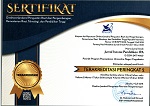Perilaku Menyimpang Mahasiswa dalam Kinerja Akademik di Perguruan Tinggi
Abstract
This study aimed to describe the forms, causes, and efforts to minimize the occurrence of deviant behavior patterns in college students. This study used a qualitative approach with the type of case study research. The main subjects in this study were students of the Pancasila and Citizenship Education Study Program, Faculty of Social Sciences, State University of Malang, who were supported by the involvement of lecturers and teaching staff as supporting informants. Observations, interviews, and documentation were used as procedures for data collection techniques. Data analysis was carried out through several stages, including data reduction, data presentation, and drawing conclusions. The results of the study showed that there were three forms of student deviant behavior in academic performance, namely the fabrication of research proposals in the Pancasila and Citizenship Education Seminar, falsification of assignments for the Personality Psychology course, and plagiarism of Public Policy course assignments. The causes of this deviant behavior were laziness, lack of time management, and lack of learning discipline. The two-way communication process through deliberation and delivery of commitments to improve behavior was chosen as an effort to minimize the occurrence of deviant behavior in academic performance in universities.
Keywords
Full Text:
PDFReferences
Al-Hakim, S. (2014). Pendidikan Kewarganegaraan dalam Konteks Indonesia. Malang: Madani.
Anderman, E. M. (2002). School Effects on Psychological Outcomes During Adolescence. Journal of Educational Psychology, 94(4), 795-809.
Anjani. (2019). Penyimpangan dan Sanksi. Jakarta: Kementerian Riset, Teknologi, dan Pendidikan Tinggi Republik Indonesia.
Astuti, A. (2016). Pengembangan Nilai-Nilai Kewarganegaraan dalam Kegiatan Ekstrakurikuler Pramuka di SMA Negeri 1 Kahu Kabupaten Bone. Jurnal Tomalebbi, 1(3), 19-26.
Aulia, F. (2015). Faktor-Faktor yang Terkait dengan Kecurangan Akademik pada Mahasiswa. RAP UNP, 6(1), 23-32.
Bandura, A., Freeman, W. H., & Lightsey, R. (1999). Self-Efficacy: The Exercise of Control. Journal of Cognitive Psychotherapy, 13(2), 158-166.
Basrowi & Suwandi. (2008). Memahami Penelitian Kualitatif. Jakarta: Rineka Cipta.
Creswell, J. (2010). Research Design: Pendekatan Kualitatif, Kuantitatif, dan Mixed. Terjemahan: Achmad Fawaid. Yogyakarta: Pustaka Pelajar.
Davis, S., Drinan, P. F., & Gallant, T. B. (2009). Cheating in School: What We Know and What We Can Do. Chichester: Wiley-Blackwell.
Debnath, C. J. (2016). Plagiarism: A Silent Epidemic in Scientific Writing-Reasons, Recognition and Remedies. Medical Journal Armed Forces India, 72(2), 164-167.Devito, J. A. (1997). Komunikasi antar Manusia. Jakarta: Professional Books.
Drenan, P. (1999). Loyalty, Learning, & Academic Integrity. Liberal Education, 85(1), 28-33.
Eriksson, L., & Mcgee, T. R. (2015). Academic Dishonesty Amongst Australian Criminal Justice and Policing University Students: Individual and Contextual Factors. International Journal for Educational Integrity, 11(1), 1-15.
Eungoo, K., & Hwang, H. J. (2020). The Consequences of Data Fabrication and Falsification among Researchers. Journal of Research and Publication Ethics, 1(2), 7-10.
Gillispie, K. A. (2003). The Frequency and Perceptions of Academic Dishonesty Among Graduate Students: A Literature Review and Critical Analysis. Menomonie: University of Wisconsin-Stout.
Handa, N., & Power, C. (2005). Land and Discover! A Case Study Investigating the Cultural Context of Plagiarism. Journal of University Teaching & Learning Practice, 2(3), 62-84.
Horton, P. B., & Chester L. H. (1993). Sosiologi Jilid 1. Terjemahan: Amminudin Ram dan Tita Sobari. Jakarta: Penerbit Erlangga.
Hughes, J. M. C., & McCabe, D. L. (2006). Understanding Academic Misconduct. Canadian Journal of Higher Education, 36(1), 49-63.
International Center for Academic Integrity. (2014). The Fundamental Values of Academic Integrity. Clemson: Clemson University.
Macfarlane, B., Zhang, J., & Pun, A. (2012). Studies in Higher Education Academic Integrity: A Review of the Literature. Studies in Higher Education, 39(2), 1-20.
Macintyre, A. (2007). After Virtue a Study in Moral Theory. Notre Dame: University of Notre Dame Press.
Masruroh, A., & Mudzakkir, M. (2013). Praktik Budaya Akademik Mahasiswa. Paradigma, 1(2), 1-12.
News.detik.com. (2010). Plagiarisme Bisa Dicegah dengan Software. (Online). Diakses pada 20 Juni 2020.
Prihantini, F. N., & Indudewi, D. (2016). Kesadaran dan Perilaku Plagiarisme di Kalangan Mahasiswa (Studi pada Mahasiswa Fakultas Ekonomi Jurusan Akuntansi Universitas Semarang). Jurnal Dinamika Sosial Budaya, 18(1), 68-75.
Rachmanidah, A., & Rohmiyati, Y. (2018). Analisis Tingkat Plagiarisme Karya Ilmiah Jurnal Mahasiswa Ilmu Perpustakaan UNDIP Tahun 2015-2016 dengan Software Turnitin. Jurnal Ilmu Perpustakaan, 7(3), 11-20.
Republik Indonesia. (2003). Undang-Undang Nomor 20 Tahun 2003 tentang Sistem Pendidikan Nasional. Lembaran Negara Republik Indonesia Tahun 2003 Nomor 78. Tambahan Lembaran Negara Republik Indonesia Nomor 4301.
Rousseau, R., Egghe, L., & Guns, R. (2018). Becoming Metric-Wise: A Bibliometric Guide for Researchers. Cambridge: Chandos Publishing.
Sahrani, R. (2020). Angka Plagiarisme Naik, Apa Pentingnya Jadi Mahasiswa Berintegritas?. (Online). Diakses pada 23 Juni 2020.
Santoso, D., & Yanti, H. B. (2015). Pengaruh Perilaku Tidak Jujur dan Kompetensi Moral terhadap Kecurangan Akademik (Academic Fraud) Mahasiswa Akuntansi. Media Riset Akuntansi, Auditing, & Informasi, 15(1), 1-15.
Silahuddin, S. (2016). Budaya Akademik dalam Sistem Pendidikan Dayah Salafiyah di Aceh. Aceh: Bandar Publishing.
Sitorus, M. (1994). Perkenalan dengan Sosiologi Jilid I-A untuk SMU. Jakarta: Penerbit Erlangga.
Stone, T. H., Jawahar, I., & Kisamore, J. L. (2010). Predicting Academic Misconduct Intentions and Behavior Using the Theory of Predicting Academic Misconduct Intentions and Behavior Using the Theory of Planned Behavior and Personality. Basic and Applied Social Psychology, 32(1), 35-45.
Tukiran, T. (2006). Materi Pendidikan Kewarganegaraan di Perguruan Tinggi dalam Menghadapi Tantangan Era Global. Jurnal Cakrawala Pendidikan, 25(3), 355-378.
Winataputra, U. S., & Saripudin, S. (2011). Dinamika Konseptualisasi Pendidikan Ilmu Pengetahuan Sosial (PIPS) dan Pendidikan Kewarganegaraan (PKn) Pada Pendidikan Dasar dan Menengah (Suatu Telaah Collective Mindset dalam Ranah Historis-Epistemologis). Jurnal Pendidikan, 12(1), 1-20.
Wolfe, D. T., & Hermanson, D. R. (2004). The Fraud Diamond: Considering the Four Elements of Fraud. The CPA Journal, 12(2004), 38-42.
DOI: http://dx.doi.org/10.17977/um019v6i1p210-219
Refbacks
- There are currently no refbacks.
Copyright (c) 2021 Jurnal Ilmiah Pendidikan Pancasila dan Kewarganegaraan

This work is licensed under a Creative Commons Attribution 4.0 International License.
View My Stats










